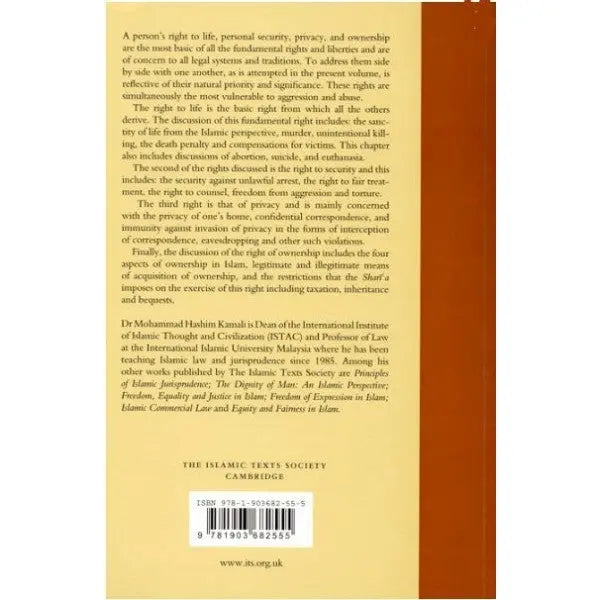A person’s right to life, personal security, privacy, and ownership are the most basic of all the fundamental rights and liberties and are of concern to all legal systems and traditions. To address them side by side with one another, as is attempted in the present volume, is reflective of their natural priority and significance. These rights are simultaneously the most vulnerable to aggression and abuse.
The right to life is the basic right from which all the others derive. The discussion of this fundamental right includes: the sanctity of life from the Islamic perspective, murder, unintentional killing, the death penalty and compensations for victims. This chapter also includes discussions of abortion, suicide, and euthanasia.
The second of the rights discussed is the right to security and this includes: the security against unlawful arrest, the right to fair treatment, the right to counsel, freedom from aggression and torture.
The third right is that of privacy and is mainly concerned with the privacy of one’s home, confidential correspondence, and immunity against invasion of privacy in the forms of interception of correspondence, eavesdropping and other such violations.
Finally, the discussion of the right of ownership includes the four aspects of ownership in Islam, legitimate and illegitimate means of acquisition of ownership, and the restrictions that the Sharia imposes on the exercise of this right including taxation, inheritance and bequests.
About Author:
Mohammad Hashim Kamali (born February 7, 1944, Nangarhar Province, Afghanistan) is an Afghan Islamic scholar and former professor of law at the International Islamic University of Malaysia. He taught Islamic law and jurisprudence between 1985 and 2004. Born in Afghanistan in 1944, he graduated from the University of Kabul and the University of London.
Kamali is the author of Islamic Commercial Law (2000), a study of the application of Shariah principles to some crucial financial instruments, options and futures contracts. He takes a much more permissive view of these instruments than do most Islamists.
In his book, Islamic Commercial Law (2000), Kamali wrote, for example, that many have "passed prohibitive judgments on futures and options" who have "not only failed to produce decisive evidence in support of their positions but have done so on the assumption that futures trading has no social utility and has no bearing on the welfare... of the people."
Among the scholars who pass the "prohibitive judgments" with which Kamali disagrees are Muhammad Akram Khan and Umar Chapra.
Mohammad Hashim Kamali served as Professor of Islamic law and jurisprudence at the International Islamic University Malaysia, and also as Dean of the International Institute of Islamic Thought & Civilisation (ISTAC) from 1985-2007. He is currently the CEO of the International Institute of Advanced Islamic Studies (IAIS) Malaysia under the newly appointed Chairman of the Institute, Former Prime Minister of Malaysia, Tun Abdullah Haji Ahmad Badawi. He studied law at Kabul University and then served as Assistant Professor, and subsequently as Public Prosecutor with the Ministry of Justice, Afghanistan, 1965-1968. He completed his LL.M. in comparative law and a PhD in Islamic and Middle Eastern law at the University of London, 1969–1976.
Table of Contents
|
Chapter 1: |
Right of Life |
|
Chapter II: |
Right to Personal Security |
|
Chapter III: |
Right to Privacy |
|
Chapter IV: |
Right of Ownership |
|
Bibliography |
|
|
Index: |




